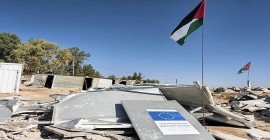Shami Tiles: A Historic Legacy in Nablus and Fears of Extinction
Each piece of Shami tile is a piece of art in itself. Its colors and elaborate details remind us of an elegant past and of a beauty crafted by skilled hands, piece by piece. The only Shami tile factory in Palestine and perhaps in the whole Middle East is found in Nablus.
Baker Atili – Palestine Economy Portal
Translated by: Tamara Barakat
The tile factory was established in Nablus in 1939. At that time, colored tile was manufactured in several Palestinian cities, such as Jaffa, Haifa, and Acre. However, nowadays, this factory is the only remaining colored tile factory as the craft diminished and demand on less expensive, ready-made tiles increased.
Legacy of Ancestors and an Ancient History
Jalal Aslan says, “I have inherited this craft from my father, who inherited it from his grandfather. This craft dates back to 130 years in our country.” Aslan still preserves the legacy of his ancestors of manufacturing traditional handmade tiles in his workshop, found in the middle of Nablus.
Although colored tile, also known as “Shami tile,” is believed to have originated in the Levant, some sources say that it is a French craft. Aslan agrees, saying, “Colored tiles originated in France and were brought into the Levant as a result of the French colonialism.”
The workshop employs tile manufactures who have been working in the industry for more than 60 years, as well other new young manufacturers who have learned the craft, in order to allow the workshop to continue operating.
Aslan mentions that his factory is the sole existing factory for manufacturing traditional tile in the Middle East. The craft is still practiced as it was a hundred years ago; the only thing to have changed is the use of electronic presses rather than hand-operated ones.
“What distinguishes this tile is its ability to withstand time. We have tested some samples of it and our testing system estimated that the samples date back to 500 years ago. This can be noticed upon visiting the houses in the Old City in Nablus and Jerusalem,” he adds.
Limited Production
Tile manufacturing involves several steps. The worker starts by painting the decorations using colors, a job very similar to that of a painter. Then, he fills the mold with cement and crushed stones, and presses them using the electronic press. The end result is a masterpiece of breathtaking beauty.
Even though “Aslan Tiles” manufactures more than 500 designs of colored tiles, its production rate is very limited and does not exceed 30 m2 of tile on a daily basis.
Aslan says, “The drawings are historic and ancient, and our newest decorations are 100 years old. We also have the ability to paint custom designs and colors as per the demand of the customer, but creating new designs requires a lot of money and effort.”
He explains that the limited production of floor tiles depends on the market demand. “Some say that this craft has vanished and become 'extinct’. Our customers are the ones who are concerned with this tradition and the ones who are able to reach us.”
He adds, “The factory’s production capacity is around 30 meters of colored tiles, and we are capable of improving it, but we manufacture based on the market demand.”
Aslan Tiles manufactures its unique products in the West Bank, targeting homes and renovations of sites and ancient castles. It also exports its products to Jordan, the UAE, and the Palestinian Proper of 1948. The average price of a square meter of colored tile is 140 shekels, while its manufacturing cost is around 90 shekels, including the wages of the employees and the base materials. According to Aslan, this factory supports 15 – 20 families in Nablus. Provides for
Fears of Extinction
Aslan expressed his great fear over the extinction of this traditional craft, especially since the prospects of its development are limited. He explains, “The prospects of developing this craft are pretty limited due to the limited market demand on traditional tile. Also, developing this traditional craft will render it 'untraditional,’ like what happened in France. There, they manufacture colored tile using computers and not by hand, which made this craft lose its splendor and quality.”
He continues, “All our efforts are to preserve this historical craft and allow it to continue, despite its current low revenue.”
Regarding the problems that he faces, Aslan says, “We face a problem in exporting our products since we have not been able to obtain a certificate of origin from the Ministry of Economy because the Municipality of Nablus has not issued us a crafts and industries license. It refuses to do so because we are located within the municipal boundaries. However, we have obtained a factory license.”
He adds, “The Ministry of Economy asked us to renew our lease, which is impossible because it is very difficult to reach the heirs of the factory. Some of them are dead and some live out of Palestine. The Ministry refused to license the factory based on the available documents.”
Aslan stresses that he has refused the Israeli offer to move his factory to Jaffa, which was occupied in 1948. “I have received many offers from Israeli businessmen to move the factory to Jaffa, but I refuse to do so because I believe Palestine is more deserving of this factory. All I need is support through facilitating the issuance of a certificate or origin to be able to export my products abroad.”





